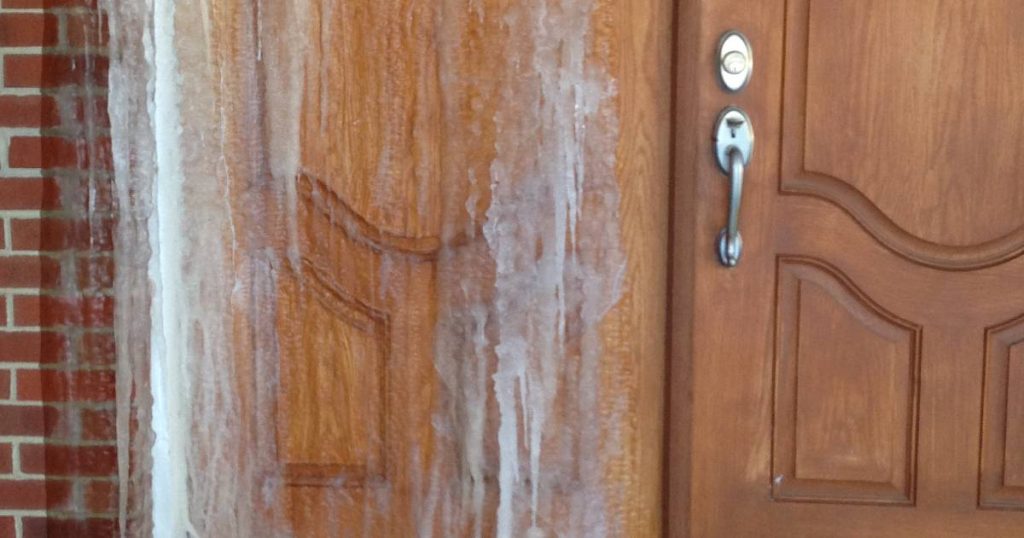
WINTER WATER DAMAGE CAN DEVASTATE YOUR HOME
Michigan residents know just how unpredictable winters can be and how dropping temperatures can cause a series of damaging affects to their homes and businesses. Preventing winter water damage to your home can save you thousands in repairs cost and keep your home free from the harm that unpredictable temperature changes can bring. Action Extraction flood restoration of Michigan has seen a wide array of destructive winters over the last 35 years and hopes to share some helpful information that may spare you the grief of a winter water damage nightmare. Water damage restoration in Washington Twp. was greatly affected by the winter of 2012 costing millions in property damage from freezing.
TEMPERATURE DROPS CAN CAUSE NIGHTMARES
Michigan winters can have a day that goes from above freezing to below 32° or lower in several hours. The sudden drop can cause copper water pipes to freeze, swell and burst allowing a force of unabated water to fully inundate the main floor of your home. If not caught and managed in a few minutes the running water will deluge below to a basement or crawlspace. Flooring such as carpet and laminate do not fare well when exposed to the presence of water, often becoming permenently damaged. Wet drywall, wood trim and cabinetry will equally be in a state of ruin. Additionally these materials are made from cellulose the prefered food source for mold growth.
Every Michigan home is at risk for winter water damage from freezing temperatures, thawing snow and ice jams if measures are not taken to prevent it. Don’t let your home or business suffer needlessly from winter water damage when there are things that can be done that do not require a great expenditure of time or money.
In this article, we hope to acquaint the reader with important tips that can keep your valued property safe, strong and fortified this winter. Flood damage can affect the value of your home from minor cosmetic damages to full blown structural and mold damage.
5 WAYS WINTER WATER DAMAGE CAN DAMAGE YOUR HOME
1. Frozen Pipes
When the temperature falls to 32ºF or below, any of your plumbing that is not fortified with insulation or warmer air will freeze. Insurance claims skyrocket during the winter months because pipes are not kept safe from freezing temperatures. When water in a pipe drops to a temperature allowing for phase shift (going from liquid to solid) that solid known as ice immediattely swells the interior of the pipe making it crack and burst open. Innitially you may not notice this because ice is preventing the water from spraying everywhere. As soon as temperatures increase and water phase shifts to liquid, flooding begins.
Unabated running water introduces the property to extreme damage that will require professional restoration in most instances, due to the gravity of damage. The good news is homeowners insurance typically covers this type of damage assuming you were paying for utilities to keep your property heated during the winter.
WINTERIZING PIPES can prevent winter water damage to your home when temperatures drop suddenly. If you have a basement where water pipes are near exterior walls or basement windows, make sure there is heat that allows for temperatures above 55° all winter long. Even then your not safe if cold drafts are dirrectly coming into contact with water pipes. These need additional sources of help such as water pipe insulating tubing that can be purchased at your local hardware store.
SHUTTING OFF & DRAINING water lines not used during winter months is essential to keep these type lines from freezing. This would include exterior water spigots, underground sprinkler systems and swimming pool lines. The addition of a water insulating shroud over outside water recepticles can give added protection that can help prevent winter water damage to your home.
2. Added Stress To Water Heater
Water heater placement in most homes and businesses is in a utility room often located in basements. Basements will experience lower temperatures during the winter months making the window of temperature change from lower to hotter increased. Metals expand and contract with heat changes placing water heaters at levels of added stress. While most newer systems will fare better than older, each will experience an increase in output loads that may cause leaking. Older units will have measurable sediment at the bottom which will absorbe the heat placing extra work on the heating system to keep up with the demand for hot water. Flooding from a water heater is rare but chances of this happening increase during the colder months. Is there a way to prevent winter water damage to your home from a faulty water heater? Yes!
ROUTINE INSPECTION by checking the area the water heater is placed in for signs of leaking. Water drops on the top or by plumbing fittings or water stains on the floor can be evidence of an issue about to become worse. Regularly inspecting the water heater during the winter may discover a potential for water damage allowing you to replace it before it’s too late.
UNFAMILIAR SOUNDS coming from the water heater can also be a sign it is under stress and about to burst. The continual expanding and contracting of materials during use eventually take its toll, making the average life expectancy of a water heater 8-12 years.
PLACING A WATER SENSOR on the floor near the unit will alert you if the system begins to leak so you can either repair or replace the unit. This will spare you the horror of days later stumbling into a fully flooded basement.
3. Melting and Thawing Snow
Michigan winters are known for those unexpected but welcomed days when temperatures dramatically rise making the promise of spring that much closer. These days however, can quickly melt large snow piles making the resulting water pose a major threat to your property.
If the melted snow produces water accumulation by your foundation, water can quickly inundate the basement. Additionally if the ground water raises swiftly a basement floor drain may backup with water. If your home has a sump pump that fails, this too can cause your basement to experience water damage.
Basements are naturally at added risk for mold growth due to the natural dampness they hold being beneath the ground. So it is important to keep melted snow and thawing snow from getting in through compromises in the foundation and/or floor drains. As a matter of fact, melting and thawing snow during the winter is one of the most common causes of basement flooding. To prevent this type of winter water damage from assualting your home, you need to do several things.
DON’T ALLOW SNOW BANKS NEAR THE HOME. Instead make sure shoveled snow is directed away from the home and not near it.
MAKE SURE GUTTERS ARE CLEANED OUT. When snow from the roof melts it needs to be swiftly carried away by the gutters and channeled away from the home. Obstructions and blockages from leaves, twigs and debris can allow for water to creep in and bring water damage into the attic, ceilings and even walls and flooring.
INVEST IN A SNOW REMOVAL RAKE. Heavy snow on the roof that quickly thaws will allow for an abundance of water that needs to go somewhere fast. Because it follows the path of least resistance, it may come in through damaged shingles or other compromised roofing materials. Using a snow removal rake can manually and safely remove the snow off your roof so there is less to melt.
4. Poorly Insulated Home.
Cold air is a highly successful invader of a home or business. It will come in as easily as a theif who discovers your doors are not locked. One of the best ways of preventing winter water damage to your home, is to add insulation where compromises exist.
WATER LINES NEAR DRAFTS need added pipe insulation of foam or fiberglass which will sheild materials vulnerable to freezing. If a water line is exposed to outside temperatures through drafts, it needs the extra reinforcement of pipe insulation. Michigan winters are predictably treacherous with sudden drops in t. Added insulation can spare your home a monumental water damage catastrophy from a frozen pipe.
ROOMS WITH DIFFICULTY MAINTAINING TEMPERATURES need extra heat. Placing a safe space heater is these rooms will give added protection from outside temperatures. These simple and proven heat systems tend to be designed with an elegantly appeal to add not only heat but attractiveness. We recommend only an electric space heater as they are safest and have automatic shutoffs. Placing additional heat where needed is an affordable way of preventing winter water damage to your home.
5. Condensation Issues
Cold surfaces naturally act as a magnet where humidity condenses as water. This is something most homeowners have seen before on their window panes on cold wintery days. A deeper investigation will also find this same phenomena on other cold surfaces, including water pipes, metal panels and exterior walls of a basement.
The colder the weather conditions the more likely water condensation happens. In the absence of newer vinyl or fiberglass windows that amount of water buildup around the windows can be abundant. This saturation on older non-efficient window panes can drip down to even the sils themselves. in extreme situations walls, carpet and hard surface flooring can be found with puddles. These same areas are often found to become black with mold growth during the winter months.
How can you help mitigate water from condensating on surfaces? REDUCING EXCESSIVE HUMIDITY can be a good step in managing condensation. If your furnace has a humidifier, be sure to turn it down or off before the cold weather sets in. REGULARLY WIPE WATER FROM SURFACES. Keep watch daily on your windows, plumbing and toilet tanks throughout the winter. If you notice condensation, wipe up the water and you will increase the chances for a dry safe environment.
If your home has any of the issues mentioned in this article, following our guidelines are proven for preventing winter water damage to your home. If you find a water damage issue in your home or business and need the help of a professional restoration company, give the professionals at Action Extraction a call today.
CLICK ON OUR: Cities we serve page to learn more about our services in your city.



